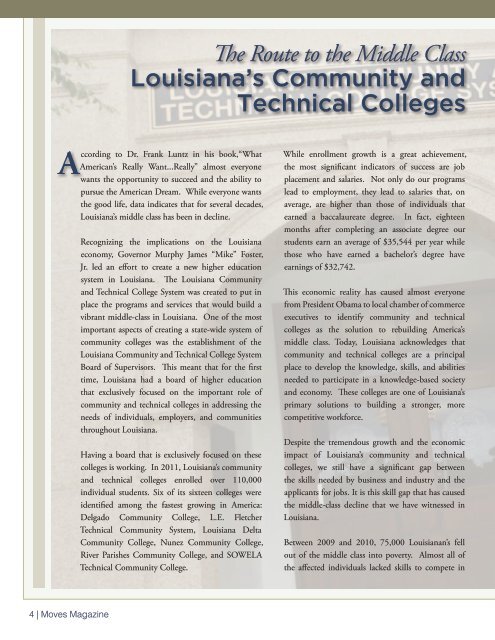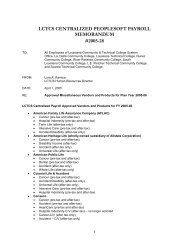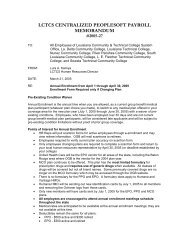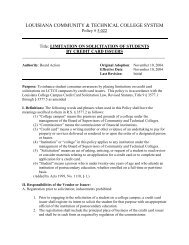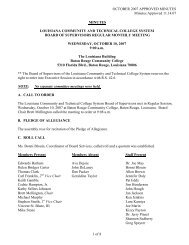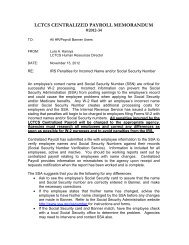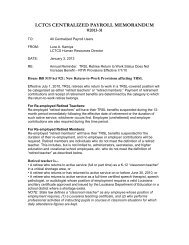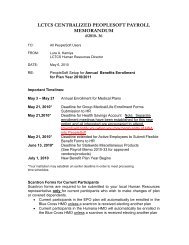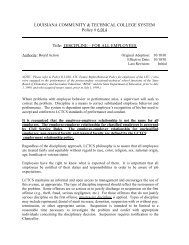Better Policy - Louisiana Community and Technical College System
Better Policy - Louisiana Community and Technical College System
Better Policy - Louisiana Community and Technical College System
You also want an ePaper? Increase the reach of your titles
YUMPU automatically turns print PDFs into web optimized ePapers that Google loves.
The Route to the Middle Class<br />
<strong>Louisiana</strong>’s <strong>Community</strong> <strong>and</strong><br />
<strong>Technical</strong> <strong>College</strong>s<br />
ccording to Dr. Frank Luntz in his book,“What<br />
American’s Really Want...Really” almost everyone<br />
wants the opportunity to succeed <strong>and</strong> the ability to<br />
pursue the American Dream. While everyone wants<br />
the good life, data indicates that for several decades,<br />
<strong>Louisiana</strong>’s middle class has been in decline.<br />
Recognizing the implications on the <strong>Louisiana</strong><br />
economy, Governor Murphy James “Mike” Foster,<br />
Jr. led an effort to create a new higher education<br />
system in <strong>Louisiana</strong>. The <strong>Louisiana</strong> <strong>Community</strong><br />
<strong>and</strong> <strong>Technical</strong> <strong>College</strong> <strong>System</strong> was created to put in<br />
place the programs <strong>and</strong> services that would build a<br />
vibrant middle-class in <strong>Louisiana</strong>. One of the most<br />
important aspects of creating a state-wide system of<br />
community colleges was the establishment of the<br />
<strong>Louisiana</strong> <strong>Community</strong> <strong>and</strong> <strong>Technical</strong> <strong>College</strong> <strong>System</strong><br />
Board of Supervisors. This meant that for the first<br />
time, <strong>Louisiana</strong> had a board of higher education<br />
that exclusively focused on the important role of<br />
community <strong>and</strong> technical colleges in addressing the<br />
needs of individuals, employers, <strong>and</strong> communities<br />
throughout <strong>Louisiana</strong>.<br />
Having a board that is exclusively focused on these<br />
colleges is working. In 2011, <strong>Louisiana</strong>’s community<br />
<strong>and</strong> technical colleges enrolled over 110,000<br />
individual students. Six of its sixteen colleges were<br />
identified among the fastest growing in America:<br />
Delgado <strong>Community</strong> <strong>College</strong>, L.E. Fletcher<br />
<strong>Technical</strong> <strong>Community</strong> <strong>System</strong>, <strong>Louisiana</strong> Delta<br />
<strong>Community</strong> <strong>College</strong>, Nunez <strong>Community</strong> <strong>College</strong>,<br />
River Parishes <strong>Community</strong> <strong>College</strong>, <strong>and</strong> SOWELA<br />
<strong>Technical</strong> <strong>Community</strong> <strong>College</strong>.<br />
While enrollment growth is a great achievement,<br />
the most significant indicators of success are job<br />
placement <strong>and</strong> salaries. Not only do our programs<br />
lead to employment, they lead to salaries that, on<br />
average, are higher than those of individuals that<br />
earned a baccalaureate degree. In fact, eighteen<br />
months after completing an associate degree our<br />
students earn an average of $35,544 per year while<br />
those who have earned a bachelor’s degree have<br />
earnings of $32,742.<br />
This economic reality has caused almost everyone<br />
from President Obama to local chamber of commerce<br />
executives to identify community <strong>and</strong> technical<br />
colleges as the solution to rebuilding America’s<br />
middle class. Today, <strong>Louisiana</strong> acknowledges that<br />
community <strong>and</strong> technical colleges are a principal<br />
place to develop the knowledge, skills, <strong>and</strong> abilities<br />
needed to participate in a knowledge-based society<br />
<strong>and</strong> economy. These colleges are one of <strong>Louisiana</strong>’s<br />
primary solutions to building a stronger, more<br />
competitive workforce.<br />
Despite the tremendous growth <strong>and</strong> the economic<br />
impact of <strong>Louisiana</strong>’s community <strong>and</strong> technical<br />
colleges, we still have a significant gap between<br />
the skills needed by business <strong>and</strong> industry <strong>and</strong> the<br />
applicants for jobs. It is this skill gap that has caused<br />
the middle-class decline that we have witnessed in<br />
<strong>Louisiana</strong>.<br />
Between 2009 <strong>and</strong> 2010, 75,000 <strong>Louisiana</strong>n’s fell<br />
out of the middle class into poverty. Almost all of<br />
the affected individuals lacked skills to compete in<br />
4 | Moves Magazine


